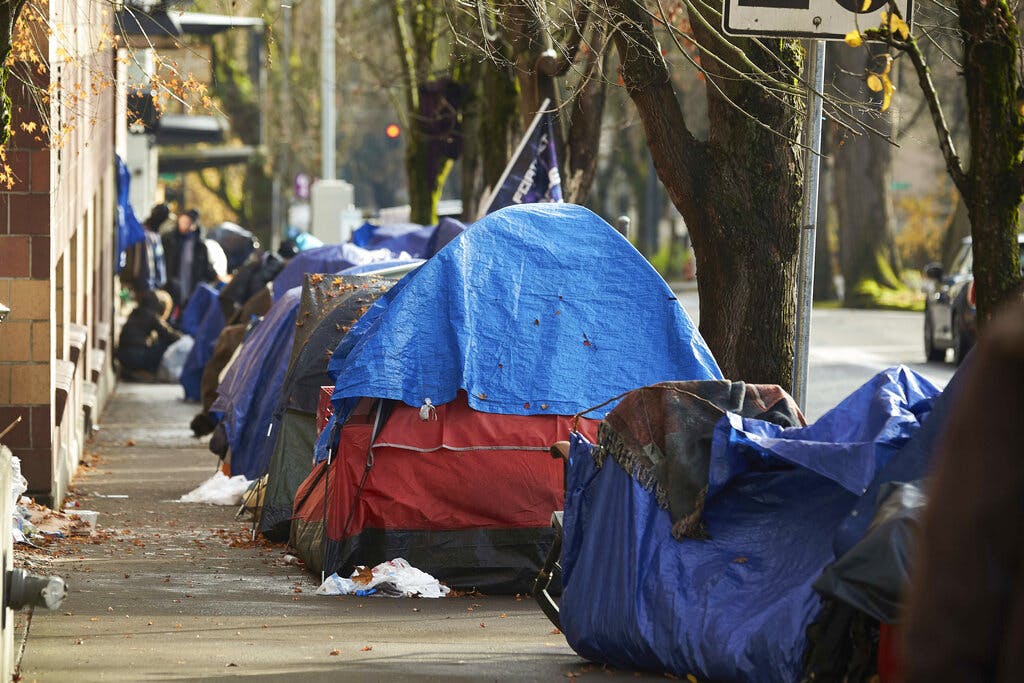California’s Capital City Is Being ‘Devoured’ by Homelessness Crisis, Costing Taxpayers Millions, Audit Finds
A shocking growth in spending on homelessness at Sacramento sheds light on an issue afflicting western cities.

As the Supreme Court prepares to take up a major homeless encampment case in April, an audit carried out by California’s capital city says its resources are being “devoured” by the homelessness crisis.
Sacramento taxpayers bore the brunt of $57.3 million in spending on homelessness in 2022-2023 — a more than five-fold increase since 2015 —an independent audit presented to the City Council this week found.
The shocking growth in spending sheds light on the extent of homelessness worsening in West Coast cities. Many of them blame the Ninth Circuit court ruling in Johnson v. City of Grants Pass, which, building on a 2018 case, Martin v. Boise, ruled that a lack of available shelter beds meant being homeless is “involuntary” and thus arresting homeless people sleeping or camping in public is “cruel and unusual.”
The Supreme Court is set to hear arguments on April 22 on the Grants Pass case in which the small Oregon city is seeking to enforce its anti-camping ordinances.
At Sacramento, meanwhile — another city bound by the Ninth Circuit court — the increase in homeless people “has devoured resources, strained relationships, provoked litigation, and thrust the City of Sacramento (City) into the national spotlight for facing one of the most challenging homeless crises in the country,” the audit notes.
The increased spending comes as Sacramento County had an estimated 9,278 homeless people on any given night in 2022 — a 67 percent increase from 2019’s count.
Citing the Ninth Circuit’s rulings, the audit notes that “addressing the magnitude of the homeless crisis has been inhibited by recent legal precedent established by the federal courts that severely limits a local municipal agency’s abilities to enforce certain laws in seeking to mitigate the homelessness crisis.”
Those appellate rulings have “put significant pressure on local agencies to expend significant funds to deal with a growing homeless population,” the audit adds.
The city has employed a variety of tactics so far in its attempts to manage the crisis, including creating a site for so-called tiny homes and allowing contentious “safe ground” sites — self-governing encampments on city-owned land equipped with city-funded accommodations. These facilities have “vastly different related costs,” the audit notes, and those costs are driven up by services including fencing and “private security staffed at all times.”
The city also is facing a lawsuit from Sacramento County’s district attorney, Thien Ho, who argues that city leadership has “allowed, created, and enabled a public safety crisis” and conditions resembling a “Third World” country by not enforcing the law, as the Sun has reported.
In addition to public drug use, defecation, and indecent exposure issues affecting local business owners and residents, the sprawling encampments have led to dangerous conditions for homeless people, who are exposed to rats, fleas, and “medieval diseases” that are “decimating” their communities, Mr. Ho asserts.
In an amicus brief in support of the city of Grants Pass ahead of the upcoming Supreme Court arguments, Mr. Ho notes that California has the largest number of homeless people in the country and that Sacramento’s homeless population exceeds even San Francisco’s. He urges the Supreme Court to rethink the Ninth Circuit rulings, which he says violate federalism by prohibiting authorities from enforcing local problems.
In California, he adds, homeless encampments are afflicted with a myriad of health and safety issues. Examples include fires erupting at encampments, thousands of hypodermic needles among tents, and even a special patrol at San Francisco that was dedicated to cleaning up enormous amounts of human feces.
His amicus brief is one of many filed by western leaders in the Grants Pass case, as attorneys for the small Oregon city say the Ninth Circuit’s ruling essentially prohibits the governments from imposing “any punishment” for public camping “when such conduct flows from the purported status of being involuntarily homeless.”
In a brief filed this week, attorneys for the two homeless people who are respondents in the Grants Pass case say the anti-camping ordinances are “cruel and unusual.”
“It is difficult to imagine a more blameless offense than resting outside with a blanket to survive the cold when you have nowhere else to go,” the filing notes.

